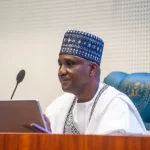Amidst the lingering high cost of living in the country and the agitation by the organisied labour to go on an unannounced strike if another increment was made on the petrol prices, President Bola Tinubu has reassured Nigerians that his administration is already moving in the direction of reducing the country’s rising fuel prices without having to go back on the decision to end the subsidy system.
President Tinubu’s special assistant on media and publicity, Ajuri Ngelale, delivered the assurances to journalists on Tuesday at the Presidential Villa in Abuja. He also revealed that the president is taking action to address inefficiencies in the petroleum sector.
It would be recalled that the Nigerian Labour Congress (NLC) had threatened to embark on an indefinite nationwide strike if the prices of PMS increased above what they currently are.
The threat, therefore, triggered rumours that fuel prices might be increased again.
Reacting to the threat by organized Labour, the president noted that such a move was premature, urging all stakeholders to be circumspect in reacting to the current situation, even as he appealed for calm from all citizens.
According to Ngelale, “The official position is that there is no increase in prices at this time and that Mr. President is convinced based on the information before him that we can maintain current pricing without reversing our deregulation policy by swiftly cleaning up existing inefficiencies within the midstream and downstream petroleum sectors.”
Speaking further, the presidential spokesman said, “The president wishes, first, to state that it is incumbent upon all stakeholders in the country to hold their peace. We have heard, very recently, from the organized Labour movement in the country with respect to their most recent threat.
“We believe that the threat was premature and that there is a need on all sides to ensure that fact-finding and diligence are done on what the current state of the downstream and midstream petroleum industry is before any threats or conclusions are arrived at or issued.
“Secondly, Mr. President wishes to assure Nigerians, following the announcement by NNPC Limited just yesterday, that there will be no increase in the pump price of premium motor spirit anywhere in the country. We repeat that the President affirms that there will be no increase in the pump price of premium motor spirits.
“We also wish to affirm that the President is determined to maintain competitive tension within all sub-sectors of the petroleum industry, he is determined to ensure that our policy drawn up, as well as policy implemented, follows the queue that there will not be any single entity dominating the market. The market has been deregulated. It has been liberalized and we are moving forward in that direction without looking back.
“The President also wishes to affirm that there are presently inefficiencies within the midstream and downstream petroleum sub-sectors that, once very swiftly addressed and cleaned up, will ensure that we can maintain prices where they are without having to resort to a reversal of this administration’s deregulation policy in the petroleum industry.”
He went further to provide insight into the performance of the decision to remove the subsidy on PMS by the president on his assumption of office in May, noting that, besides the fact that the consumption rate dropped from 67 million litres per day to 46 million, the petrol pump price is comparatively the cheapest in Nigeria in the West African sub-region by huge differences.
Ngelale stated: “I wish at this juncture to also provide a set of graphics, which the President has authorized me to share with Nigerians, that otherwise would be confidential. These are graphics supplied to Mr. President by the NNPCL. In the graphics, what you will find is the present cost of refined premium motor spirit at the pump in each of the West African nations that neighbour us, and I’ll just name some. For example, even as I know, you’ll be showing the audience’s graphics, which the President has graciously approved for public release today.
“Senegal has a pump price today of N1,273 equivalent per litre; Guinea at N1,075 per litre; Cote d’Ivoire at N1,048 per litre equivalent in their currency; Mali at N1,113 per litre; Central African Republic, N1,414 per litre. Nigeria is presently averaging between N568 and N630 per litre. We are presently the cheapest, most affordable purchasing state in the West African sub-region by some distance; there is no country that is below N700 per litre.
So, this is the backdrop. We have seen that at the inception of our deregulation policy, as of June 1, as Mr. President took office, PMS consumption in the country dropped immediately from 67 million litres per day consumption down to 46 million litres per day consumption. The impact is evident. What it also does mean, though, is that we are not at the end of the tunnel.
“There’s still a bit of darkness to travel through to get toward the light, and we are pleading with Nigerians to please be patient with us, and as we promised from the beginning, we will be open with Nigerians, we will be transparent with them, and we are ready to show you exactly what it is that our nation is facing with respect to the illiquidity in the market in terms of foreign exchange as a result of what is now known to have been a gross mismanagement of the Central Bank of Nigeria over the course of several years preceding this time.”



